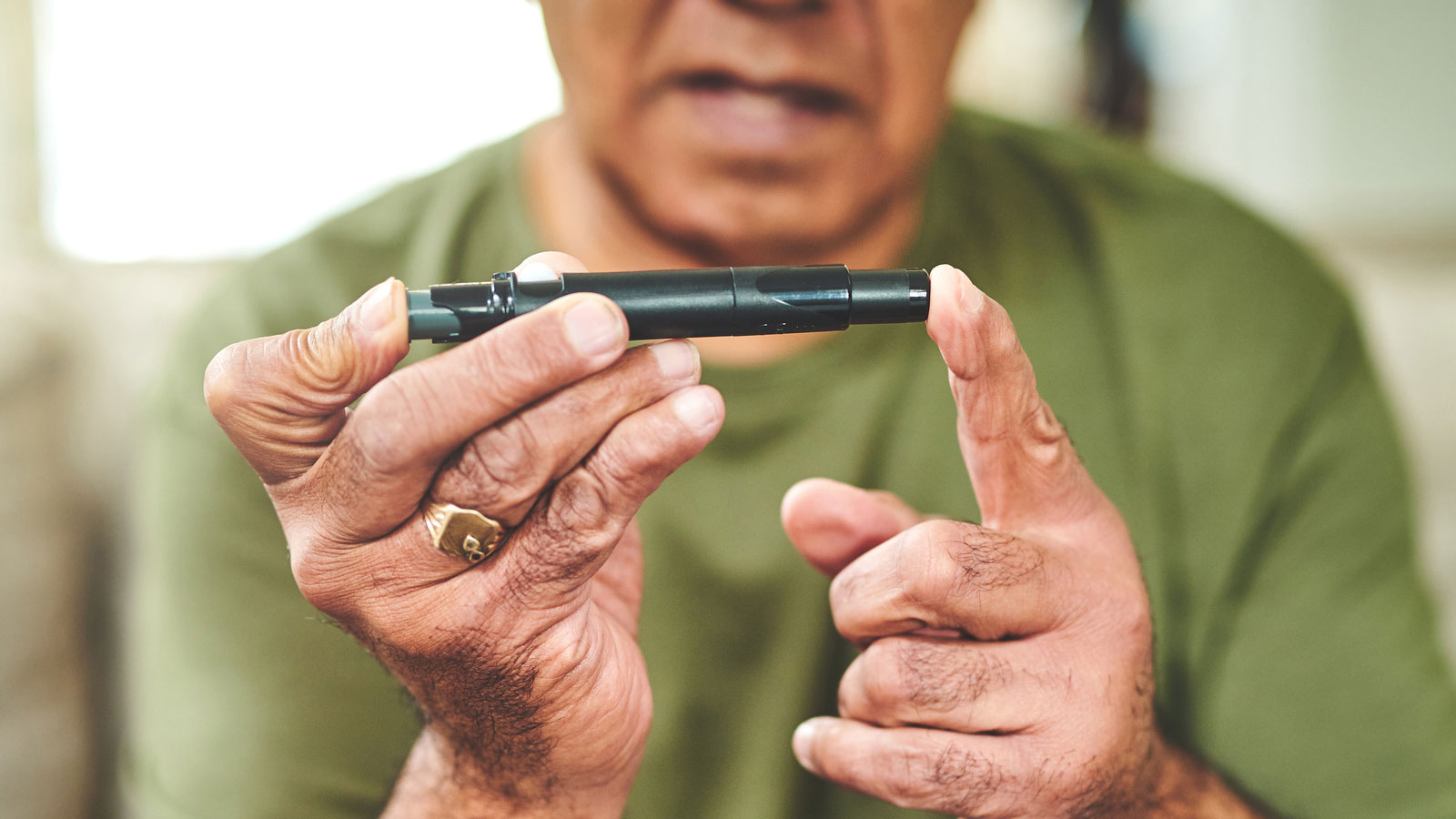How Weight-Loss Surgery Can Improve Diabetes, Heart Health, and More
Beyond weight loss, bariatric surgery helps you overcome serious health issues related to obesity, such as diabetes and heart disease. Virtua bariatric surgeon Samuel Wasser, MD, explains.

By Samuel Wasser, MD—Virtua Bariatric Surgeon, Virtua Complete Weight Management
When you visit the doctor, step on the scale, and are told that you’re obese, it hurts.
The word “obese” can feel offensive. To some, it’s a label that conjures images of a certain body size or weight or feelings of guilt, shame, or embarrassment.
But obese isn’t just a word, or a label, or a bodyweight.
Obesity is a disease—a real disease like heart disease or cancer—and more than 34% of adults in the U.S. are living with it. Like other diseases, managing obesity requires proper diagnosis, treatment, and life-long maintenance.
To be diagnosed with obesity, you have to have a body mass index (BMI) of 30 to 39.9, or 40 and higher to be diagnosed with severe obesity. When you have a BMI of 35 or more, it becomes infinitely harder to lose weight through diet and exercise alone.
In addition, obesity puts you at risk for other diseases like diabetes, heart disease, sleep apnea, back pain, and joint issues. When you put all these health challenges together, they can seem insurmountable.
But, using the tool of bariatric surgery combined with proper support, people take on this seemingly insurmountable challenge and finally succeed at losing weight. Here are the ways, beyond weight loss, that bariatric surgery can change your life—and your health—for the better.
How weight-loss surgery can improve diabetes
Obesity is a major cause of type 2 diabetes, and people who have severe obesity are 10 times more likely to have it. Bariatric surgery improves type 2 diabetes and resolves it in 80-95 percent of patients, depending on the bariatric procedure performed (for example, duodenal switch provides more powerful results than other procedures). In fact, some people experience an improvement in, or resolution of, type 2 diabetes by the time they’re home from surgery; others may see improvement more gradually. Other benefits include:
- Reduction in dosage and/or types of diabetes medications needed, or, in some cases, the elimination of diabetes medications
- Lower blood sugar
- Improvement in related health problems such as heart and coronary artery disease
How weight-loss surgery can reduce heart disease and high blood pressure
In addition to improving heart-related diabetes risks, the weight loss that comes with bariatric surgery can reduce the fat around the heart, leading to better heart health overall. Other benefits include:
- Improvement in cholesterol levels and reduction or elimination of cholesterol medications
- Lower blood pressure and reduction or elimination of blood pressure medication
- Lower risk for heart attack, heart failure, and stroke
How weight-loss surgery can prevent or improve sleep apnea
Obstructive sleep apnea (OSA) is a common, yet life-threatening, obesity-related sleep disorder that many people face. OSA occurs when the soft tissues in the airway narrow or close during sleep. Episodes of OSA can lead to sudden cardiac death, irregular heartbeat, or high blood pressure. OSA also is linked to an increased risk for diabetes and can make diabetes harder to control.
Bariatric surgery is shown to improve or resolve OSA in most patients. As you lose weight, you lose the fatty tissue that causes the narrowing of the airway and breathing interruptions. However, some patients continue to use treatments like CPAP (continuous positive airway pressure) to manage OSA.
How weight-loss surgery can relieve joint pain
Obesity puts a tremendous strain on your back, hips, and knees, leading to arthritis and back pain issues that can affect your quality of life and ability to exercise.
Weight loss from bariatric surgery helps physically relieve that strain and helps restore physical function. In addition, bariatric surgery is an effective solution for people with arthritis who need joint replacement but are required by insurance to lose weight before the surgery.
How weight-loss surgery can improve life expectancy
According to the American Society for Metabolic and Bariatric Surgery, large studies of hundreds of thousands of patients show that weight-loss surgery can lower a person’s risk of death from any cause by more than 40 percent.
Specifically, that means bariatric surgery lowers the risk of death as follows:
- Heart disease: 40% lower risk
- Diabetes: 92% lower risk
- Cancer: 60% lower risk
Virtua’s bariatric weight-loss team can help you overcome obesity
If you’ve spent years struggling to lose weight through diet and exercise changes without success, it may be time to consider bariatric weight-loss surgery.
Virtua offers sleeve gastrectomy (gastric sleeve), as well as Roux-en-Y gastric bypass, duodenal switch, and modified duodenal switch (SADI-S), which are the most effective weight-loss surgery procedures for reducing obesity-related health risks.
You CAN succeed at weight loss after bariatric surgery, and Virtua provides the right team and tools needed to help you achieve a healthy lifestyle and lasting weight-loss success.
Learn more about bariatric weight-loss surgery as part of Virtua's Complete Weight Management Program, or call 888-847-8823 to schedule a consultation with a Virtua bariatric surgeon.
There's So Much More to Explore
Discover expert insights, inspiring stories, health tips, and more by exploring the content below!

The Weird Pregnancy Side Effects No One Tells You About

10 Reasons to Schedule Your Colonoscopy Screening Today

At-Home Colon Cancer Tests vs. Colonoscopy: Which Screening Option Is Right for You?

10 Hand Washing Tips to Keep You Healthy All Year

How Exercise Helps Fight the Winter Blues and Improve Your Mood

8 Signs It's Time to See a Gastroenterologist

How the Unique Stages of a Woman's Heart Affect Her Health

Complex Aortic Surgery Provides Lu’Shell Hope for the Future

8 Stretching and Balancing Exercises for Older Adults

Cervical Cancer Screening Guidelines: What You Need to Know

Healthy Snack Recipes for Kids: Fast, Fun, and Full of Flavor

What To Eat Before And After Your Workout

HeartTalk Magazine

How to Spot the Early Signs and Symptoms of a Stroke

Healthy Takeout Made Easy: What to Order for Better Nutrition

How Weight-Loss Surgery Can Improve Diabetes, Heart Health, and More

6 Tips for an Easier Colonoscopy Prep

How to Achieve Your Health Goals This Year

Why Weight Loss Plateaus Happen (And What to Do Next)

Knee Replacement Rehab: 7 Exercises to Restore Your Strength and Range of Motion

COPD vs. Asthma: Understanding the Difference in Symptoms

Are You Eating Too Much Salt? High-Sodium Foods to Watch For

Caregiving During the Holidays: Ways to Manage Stress and Find Joy

Bioidentical Hormone Replacement Therapy Pellets: Relief for Menopause and Andropause Symptoms

Why Is Sex Painful During Pregnancy? Pelvic Congestion Syndrome Explained

COVID-19 Vaccines and Pregnancy: FAQs

Don't Drink Alcohol? You Could Still Get Fatty Liver Disease

What Is the Difference Between Palliative Care and Hospice Care?

How to Exercise Safely with Asthma: Tips, Triggers, and Rescue Inhaler Use

How to Relieve Bloating Fast: Simple Tips for Quick Comfort

COMFORTing Tips to Avoid Holiday Heartburn

How to Tell the Difference Between Cold, Flu, and COVID-19

Jill Travels From Delaware to South Jersey for Advanced Lung Care

4 Exercise Tips to Help You Reverse High Blood Pressure

From Exhaustion to Empowerment: Tracy's Hormone Replacement Therapy Success Story

How to Bounce Back From Holiday Overeating

Why on Earth Am I Always So Cold?

Daily Wellness Checklist: Simple Habits for Feeling Good Inside and Out

Timely Heart Care During a Heart Attack Helps Joe Feed the Community

Allegra Is Thriving With Crohn's Disease

The Best and Worst Foods for Acid Reflux

How to Manage IBS Symptoms and Feel in Control Again

5 Types of Lung Disease: Symptoms, Causes, and Prevention Tips

Foods to Enjoy and Avoid for GLP-1 Heartburn

3 Reasons Why Now's the Time to Find Relief From Varicose Veins

Baseball Coach Turns Male Breast Cancer Surprise into Personal Mission

The Brain Health Checklist: 11 Questions Everyone Should Ask

From Caregiver to Patient: Robotic Surgery Relieves Teresa's Knee Pain

How to Get and Stay Healthy This Fall

How to Reverse Prediabetes and Prevent Type 2 Diabetes

4 Sweet Halloween Tricks for Grown Ups Who have Diabetes

6 Ways to Get More Out of Your Daily Walk

Young Breast-Cancer Survivor Has New Hope for Healthy Future

Is Cancer Hereditary? What You Need to Know About Your Genetic Risks

Tara's Story: From Debilitating Uterine Fibroid Pain to a Half-Marathon Medal

Is Your Post-Pregnancy Belly Bulge a Sign of Diastasis Recti?

Fall Vegetables: The Health Benefits and Recipes to Try This Season

Your Guide to Mammograms: When to Get Screened and What to Know

The Top 10 Foods That Boost Your Brain Health

Is It Safe to Exercise During Pregnancy?

Prevent Yard Work Injuries: Tips for Mowing, Gardening, and Raking

How to Curb Nighttime Snack Cravings

Is Your Daily Walk Making You Really Sore?

IBS and Alcohol: Can You Still Enjoy a Drink?

Focus on Mental Health Is Key Part of Andrew's Weight-Loss Journey

What You Need to Know About Epilepsy

'Feeling Joy Again': ECT Brain Stimulation Therapy Restores Ashley's Well-Being

Lifesaving Heart Care Creates a 'Bond That's Never Left Us'

3 South Jersey Farmers Markets You Must Visit This Fall

Not Just for Wrinkles: Botox Injections Promote Improved Bladder Control

Robotic Hysterectomy, Trusted Care Help Bobbi Shine Again

Easy, Healthy Lunch Ideas for the Beach

How to Stay Cool and Prevent Heat Illness All Summer Long

Do Not Get Burned by These Sunscreen Myths

Beat the Bugs and Save Your Summer

What Happens to Your Body When You Don't Get Enough Sleep?

How to Have a Healthy Pregnancy if You're Overweight

Why You Get Sick on Vacation (and How to Stay Healthy While Traveling)

6 Hot Tips for a Safer Summer

4 Surprising Health Truths You Should Know

5 Interesting Facts About Your Heart

Is Low Sex Drive Normal? Revealing the Complex Causes of Low Libido in Women

Get to the Bottom of Blood Pressure Numbers

CABG Surgery: What Women Should Know About Heart Health and Healing

5 Feel-Good Activities to Explore Around South Jersey

Stress Incontinence vs. Urge Incontinence: What's the Difference?

5 Key Facts About Proton Therapy for Cancer Treatment

3 Changes You Can Make Today to Lower Your Cancer Risk

A Lung Cancer Screening Could Save Your Life

Mood Swings vs. Mood Disorders: Know the Signs and Get Help
Are emotional ups and downs disrupting daily life? Learn common signs of mood disorders, and when to talk to a doctor about diagnosis and treatment options.

Take Pride in our Health: Must Dos for LGBTQ+ Preventative Care

4 Foolproof Pelvic Floor Strengthening Exercises for Women

What to Expect During Perimenopause

Protect Yourself From Tick Bites and Lyme Disease

Groundbreaking Renal Denervation Procedure Controls a Lifetime of High Blood Pressure

5 Light and Healthy Recipes Perfect for Spring

10 Quick Ways to De-Stress

4 Ways to Stay Fit and Healthy on a Budget

6 Tips to Tame Your Spring Allergies

Do You Know the Signs and Symptoms of Uterine Fibroids?

How Are Uterine Fibroids Treated?

Mitral Valve Surgery Keeps Yaneth Living the American Dream

From Restless to Restful: How Movement Improves Sleep

5 Simple Ways to Spring Clean Your Wellness Routine

What to Expect From a Robotic Hysterectomy

When You Need A Hysterectomy Know Your Options

How Do You Manage the Side Effects of Weight-Loss Medications?

Which Weight-Loss Option is Best for Me?

A Woman’s Four-Step Guide to Fight Back on Back Pain

What You Need To Know About Carpal Tunnel Syndrome

The Truth About Menopause, Weight Gain, and Belly Fat

Shedding Light on Lesser-Known Menopause Symptoms and Solutions

Debunking The Myths About Vaginal Dryness
Inside Look at Blood Vessels Aids PAD Treatment
Denise Davis: Pay Attention to Your Heart Health

What You Need To Know About Stroke Treatment

Best Foods for Kidney Health

10 Smart Ways to Manage Your Diabetes

What Causes Food Addiction And What Are The Signs

Signs You May Have Chronic Kidney Disease

5 Essential Winter Foot Care Tips When You Have Diabetes

Sweet Music: Trust, Teamwork Save Justin from Heart Attack

Complex Heart Surgery Nets James a Lifelong Friend

Your 10-Point Plan to Avoid Winter Weight Gain

Hepatitis C Kidney Transplant a Blessing For Lee Manns

7 Reasons Why You Want Your Surgeon to Be an Expert in Robotics

Colitis Symptoms Under Control, Jennifer Is ‘Living My Best Life’

How Do I Care for a Wound that Won't Heal?

Surprising Symptoms May Signal Stroke In Women

8 Key Steps to Better Blood Pressure Control

Five Back Pain Risk Factors That You Should Know

Is My Back Pain Normal, or Is It Spinal Stenosis?

Augmented-Reality Surgery Has Bobby Back on Stage, Rocking His New Hip

Robotic Hernia Surgery Combines Innovative Techniques With Faster Recovery Times

5 Back Stretches for the Work-From-Home Workweek

The HPV Vaccine: A Powerful Shield Against Cervical Cancer

How Does Breast Density Affect Your Mammogram?

Menopause: New Insights Into the Power of Hormone Replacement Therapy

How to Prevent and Treat Urinary Tract Infections

Signs You Should Get Treated For Vein Problems

One New Heart Valve Saves Two Lives in the Tritten Family

What You Need to Know About Heart Failure

6 Numbers Key to Keeping Your Heart Healthy
Lung Valve Surgery Relieves COPD, Emphysema Symptoms

4 Easy Ways to Treat and Prevent Runner's Knee

Lung Screening, Robotic Technologies Get Pat Kicking Up Her Boots Again

Breast Cancer Diagnosis Inspires Catherine to Help Others

Jasmine’s On-Air and Pain-Free After Gallbladder Surgery

What is the 80/20 Diet Rule?

When Should I See a Doctor About My Knee Pain?

Quick Action Leads to Jesse's Recovery From Stroke

A Non-Athlete’s Guide to Shoulder Overuse Injuries
Shoulder problems aren’t limited to athletes. Virtua orthopedic surgeon Sean McMillan, DO, explains shoulder overuse injuries and prevention in this article.

Put Lower Back Pain Behind You With This Ten-Step Guide

Wide-Awake Hand Surgery Speeds Recovery, Puts Control in Patients' Hands

South Jersey Veteran Thrives After Cross-Country Kidney Donation

Five Mindfulness Tips That Can Help Heal Your Heart
Working from Home? Take a Quick Break to Stretch Your Wrists

3 Ways to Avoid Knee Pain

When Should I See a Doctor for My Hip Pain?

When Should I See a Doctor About My Shoulder Pain?

Is My Back Pain Normal, or Is It Sciatica?

Is My Back Pain Normal, or Is It a Herniated Disk?

When Is It Back Pain, and When Is It Something More?

Watchman Heart Device: a Technological Breakthrough for Blood Clot Prevention

Albert's Emergency Cardiac Surgery Is a 'Story of a Lifetime'

What Can I Do Right Now About My Aching Back?

How Do I Get Rid of This Back Pain for Good?

Love Your Heart: Essential Care Tips for Every Stage of Life

How Do I Measure My Blood Pressure at Home?

How Do I Improve My Cholesterol Levels?

3 Ways to Reduce Your Stroke Risk

Can Your Gut Health Affect Your Heart?

When Should I Be Worried About My Neck Pain?
Advanced Heart Failure Therapies Get Bernadine Back to Full Speed

Sarah Wins Back Her Health After Crohn's Disease Diagnosis

Overcoming Addiction, Philip Now Sees More Positive Side to Life
Firefighter's Successful Lung Cancer Care at Virtua
A Lung Screening Put Teresa Back in the Race

A Breast Self-Exam Saved Kristen's Life

How Sex Keeps You Healthy as You Age

Protect Your Child From HPV and Related Cancers

Why IUDs Might Be The Most Effective Birth Control

5 Things You're Too Embarrassed to Tell Your OBGYN

4 Not-So-Crazy Questions to Ask Your Doctor

Early Treatment is Best to Relieve Hemorrhoid Symptoms

The Top 10 Foods For A Healthy Diabetes Diet

Keeping the Beat: Advanced Heart Surgery for Aortic Aneurysm

Are You At Risk For Chronic Kidney Disease

Local Pastor Makes Kidney Health Mission of Ministry

What’s the Difference Between Type 1 and Type 2 Diabetes?

Is This the Right Time in Your Life for Bariatric Surgery?

All for Bear: Dan Loses Weight to Be His Son’s Kidney Donor

Forget Dieting: Find Your Eating Pattern

Hyperbaric Wound Therapy Puts Joette Back in Motion

Robotic Hernia Repair Renews David's Active Lifestyle

